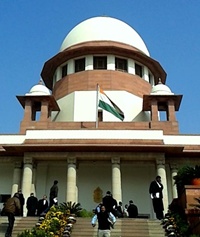Right to privacy is fundamental, 9-judge SC bench says unanimously
24 Aug 2017
The Supreme Court has ruled that the Indian citizen has a fundamental right to privacy under the Indian constitution, which should be respected and preserved, effectively derailing an unfinished biometric identification programme that the government is pushing.
 The right to privacy "is protected as an intrinsic part of Article 21 that protects life and liberty," the Supreme Court ruled.
The right to privacy "is protected as an intrinsic part of Article 21 that protects life and liberty," the Supreme Court ruled.
Today's verdict does not comment on whether the government's demand for Aadhar to be linked to all financial transactions amounts to an infringement of privacy. That decision will be taken by a separate and smaller bench of the Supreme Court.
A nine-judge constitution bench of the Supreme Court today unanimously pronounced the verdict in the petitions challenging the government's moves to make Aadhaar mandatory for all dealings.
The unanimous verdict by the constitution comprising Chief Justice JS Khehar and Justices J Chelameswar, SA Bobde, RK Agrawal, Rohinton Nariman, AM Sapre, DY Chandrachud, Sanjay Kishan Kaul and S Abdul Nazeer, also overrules earlier judgements in the MP Sharma and Kharak Singh cases.
A apex court was hearing a bunch of petitions challenging the mandatory use of digital identity cards, known as Aadhaar, as an infringement of privacy and breach of personal data.
The petitioners, former Karnataka high court judge Justice KS Puttaswamy and others, had contended that the use of biometric data and iris scan for Aadhaar cards violated the citizen's fundamental right to privacy and exposed their personal data to misuse.
Senior advocates Gopal Subramanium, Shaym Divan, Sajan Poovaya, Arvind Grover, Indira Jaising and former attorney general Soli Sorabjee position.
The Supreme Court seems to have agreed to the petitioners' view that right to life under Article 21 of the Constitution would include the right to privacy though it is not expressly stated in the Constitution.
While right to privacy is a broader concept, they argued that data sharing was only one aspect of privacy. ''Privacy is about the freedom of thought, conscience and individual autonomy and none of the fundamental rights can be exercised without assuming certain sense of privacy,'' according to Subramanium.
He also said the state is under an affirmative obligation to protect the fundamental rights of its citizens. ''Liberty is fundamental to democracy and citizens cannot exist without privacy.''
Sorabjee had added that ''Privacy is not explicitly laid out in the Constitution. But that does not mean the right does not exist as it has be deduced from the constitution''. He also argued that the freedom of the press has been derived from Article 19 and similarly, the right to privacy can be derived broadly from Article 21.
The petitioners' advocates also pointed to finance minister Arun Jaitley's statement during discussions in the Rajya Sabha on the Aadhaar Bill in March 2016 when he had said that the right to privacy was a fundamental right, although the government is claiming the opposite now.
Attorney general K K Venugopal, who had argued that right to privacy cannot be a fundamental right, welcomed the SC decision.
Critics of the Aadhaar identity card say it links enough data to allow profiling because it creates a comprehensive profile of a person's spending habits, their friends and acquaintances, the property they own, and a trove of other information.
They say that the data could be misused by a government and take away Indians' right to privacy. They also cite instances of Aadhaar details being accidentally released, including on government websites.
UIDAI, the agency that governs Aadhaar, has repeatedly said that its data is secure.


















